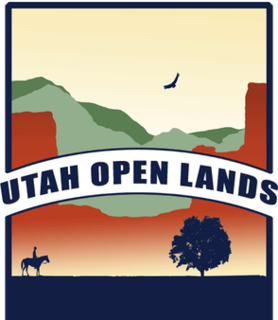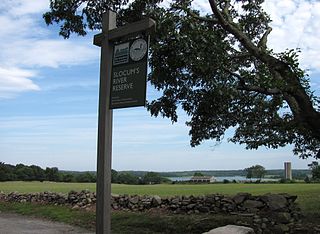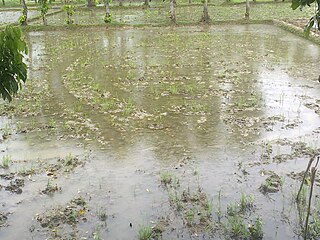In the United States, a conservation easement is a power invested in a qualified private land conservation organization or government to constrain, as to a specified land area, the exercise of rights otherwise held by a landowner so as to achieve certain conservation purposes. It is an interest in real property established by agreement between a landowner and land trust or unit of government. The conservation easement "runs with the land", meaning it is applicable to both present and future owners of the land. As with other real property interests, the grant of conservation easement is recorded in the local land records; the grant becomes a part of the chain of title for the property.
Farmland generally refers to agricultural land, or land currently used for the purposes of farming. It may also refer to:

The Trustees of Reservations is a non-profit land conservation and historic preservation organization dedicated to preserving natural and historical places in the Commonwealth of Massachusetts. It is the oldest regional land trust in the world and as of 2016 has 125,000 dues-paying members. In addition to land stewardship, the organization is also active in conservation partnerships, community supported agriculture (CSA), environmental and conservation education, community preservation and development, and green building. The Trustees of Reservations own title to 116 properties on 27,000 acres (11,000 ha) in Massachusetts, all of which are open to the public; it maintains conservation restrictions on 200 more properties. Properties include historic mansions, estates, and gardens; woodland preserves; waterfalls; mountain peaks; wetlands and riverways; coastal bluffs, beaches, and barrier islands; farmland and CSA projects; and archaeological sites.
The Commodity Credit Corporation (CCC) is a wholly owned United States government corporation that was created in 1933 to "stabilize, support, and protect farm income and prices". The CCC is authorized to buy, sell, lend, make payments, and engage in other activities for the purpose of increasing production, stabilizing prices, assuring adequate supplies, and facilitating the efficient marketing of agricultural commodities.
Farmland development rights in Suffolk County, New York began in 1975 in Suffolk County as the state of New York began a program to purchase development rights for farmland to insure they remained as farms and open space rather than being developed for housing.
Conservation development, also known as conservation design, is a controlled-growth land use development that adopts the principle for allowing limited sustainable development while protecting the area's natural environmental features in perpetuity, including preserving open space landscape and vista, protecting farmland or natural habitats for wildlife, and maintaining the character of rural communities. A conservation development is usually defined as a project that dedicates a minimum of 50 percent of the total development parcel as open space. The management and ownership of the land are often formed by the partnership between private land owners, land-use conservation organizations and local government. It is a growing trend in many parts of the country, particularly in the Western United States. In the Eastern United States, conservation design has been promoted by some state and local governments as a technique to help preserve water quality.
Development-supported agriculture is a nascent movement in real estate development that preserves and invests in agricultural land use. As farmland is lost due to the challenging economics of farming and the pressures of the real estate industry, DSA attempts to reconcile the need for development with the need to preserve agricultural land. The overall goal of DSA is to incubate small-scale organic farms that co-exist with residential land development, providing benefits to farmers, residents, the local community, and the environment.
The Conservation Campaign is a United States 501(c)(4) non-profit organization affiliated with The Trust for Public Land (TPL). It is a resource for grassroots campaigns in the USA that are concerned with raising funds for land and water conservation.
The Farmland Assessment Act of 1964 provided for reduced taxes on farmland in New Jersey in an effort to reduce the sale of farmland to developers for housing and commercial space.

Utah Open Lands Conservation Association is a 501(c)(3) nonprofit land trust conservation association in the United States.
Transferable development rights (TDR) is a method for controlling land use to complement land-use planning and zoning for more effective urban growth management and land conservation. The TDR process can be considered a tool for controlling urban sprawl by concentrating development. TDR is a legal mechanism offered in some local government jurisdictions as a form of development control. TDR are also a way to avoid constitutional takings issues caused by rezoning areas that would otherwise eliminate a significant amount of value from the property. The procedure offers landowners financial incentives or bonuses for the conservation and maintenance of the environmental, heritage or agricultural values of their land. TDR is based on the concept that with land ownership comes the right of use of land, or land development. These land-based development rights can in some jurisdictions be used, unused, sold, or otherwise transferred by the owner of a parcel.

Slocum's River Reserve is a 47-acre (19 ha) open space preserve co-managed by the land conservation non-profit organizations The Trustees of Reservations and Dartmouth Natural Resources Trust. The property includes 3,000 feet (910 m) of frontage along the bracken tidal Slocum's River in Dartmouth, Massachusetts, 2 miles (3.2 km) of trails, woodland, agricultural fields, and pasture. The reserve is open to the public.

The Land Conservancy of San Luis Obispo County (LCSLO) is a local nonprofit organization that has served San Luis Obispo (SLO) County since 1984. Through voluntary and collaborative efforts the LCSLO works to protect and enhance lands having important scenic, agricultural, habitat and cultural values for the benefit of people and wildlife. By working with both landowners and government agencies to find positive, mutually beneficial solutions, over 15,200 acres (62 km2) of land in SLO county have been permanently protected.

The Agricultural Reserve is a designated land use zone in Montgomery County, Maryland. The 93,000 acres (380 km2) zone was created in 1980 by the Montgomery County Council to preserve farm land and rural space in the northwestern part of the county. The farmland protection program has been characterized as "the most famous, most studied and most emulated" program of its kind in the United States.
Preservation development is a model of real-estate development that addresses farmland preservation. It shares many attributes with conservation development, with the addition of strategies for maintaining and operating productive agriculture and silviculture, often in perpetuity. A preservation development is a master planned community that allows limited, carefully designed development on a working farm, while placing the majority of productive land under a system of easements and community governance to ensure a continuity of farming and environmental stewardship.
Scenic Hudson is a not-for-profit environmental organization in New York that protects land, creates and enhances parks, and advocates for environmentally responsible policies and development practices.

Agriculture played a major role in the early growth of Connecticut as one of the original 13 colonies that would form the United States of America, particularly in the Connecticut River valley which provided fertile soil, temperate climate and easy access to markets. As the Industrial Revolution helped focus capital on mercantile centers in the 19th century, Connecticut farmers over time ceded their relative economic and political influence.
The Land Trust for Tennessee is an American non-profit conservation organization working to protect Tennessee's natural, scenic and historic landscapes and sites. Since 1999, The Land Trust has partnered to conserve more than 119,000 acres (480 km2) of land across 65-plus Tennessee counties.

The Big Sur Land Trust is a private 501(c)(3) non-profit located in Monterey, California that has played an instrumental role in preserving land in California's Big Sur and Central Coast regions. The trust was the first to conceive of and use the "conservation buyer" method in 1989 by partnering with government and developers to offer tax benefits as an inducement to sell land at below-market rates. As of 2016, it has protected around 40,000 acres (16,187 ha) through acquisition and resale to government agencies. It has added conservation easements to another 17,000 acres (6,880 ha) and has retained ownership of a number of parcels totaling about 4,500 acres (1,821 ha).









